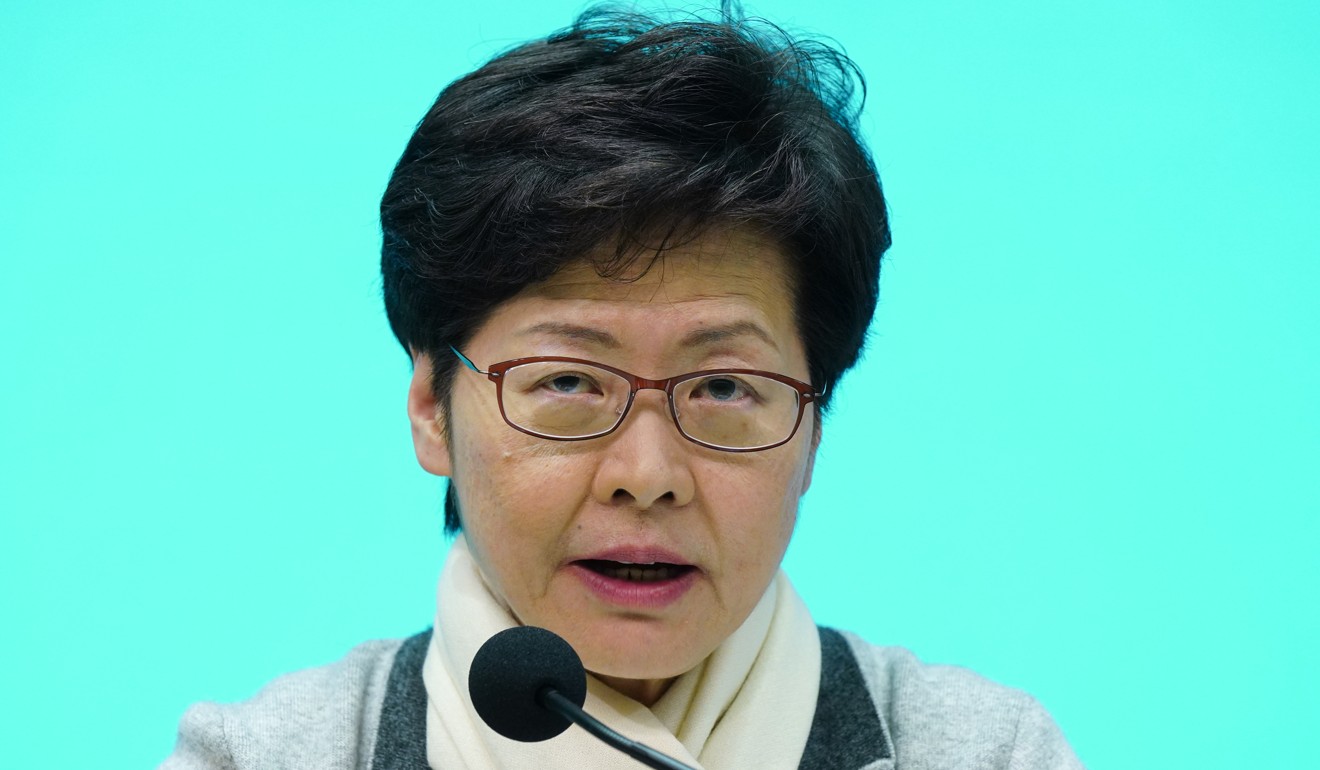
China coronavirus: Hong Kong leader adopts advice from medical experts – but draws line at closing border with mainland China
- Chief Executive Carrie Lam raises government’s response against new virus to highest level of emergency after a public outcry
- Lam also agrees to suggestions from health experts to keep schools closed until February 17 and to cancel Standard Chartered Hong Kong Marathon
Hong Kong’s embattled leader adopted the advice of local medical experts as she on Saturday launched a new wave of measures to counter the spread of the Wuhan coronavirus – though divisions remained on whether the city should tighten or even close its border with mainland China.
Lam agreed to suggestions by microbiologist Professor Yuen Kwok-yung and Professor David Hui Shu-cheong, who both sit on an advisory panel reporting directly to her, to extend the Lunar New Year holiday for schools and to cancel the Standard Chartered Hong Kong Marathon.
Critics had argued that four infected mainlanders had come from Wuhan by high-speed rail, sparking a debate over whether the city should tighten up security for visitors, especially those coming from the Hubei city at the epicentre of the outbreak.

Lam ruled out the proposal, requested by a new labour union representing medical staff at public hospitals, saying it was “inappropriate and impractical”. She added that making it mandatory to fill in a health declaration at all the city’s borders and ports – another demand from the medical experts, initially shrugged off by the government – would suffice.
Professor Gabriel Leung, the dean of University of Hong Kong’s medical school, and Hui also poured cold water on the contentious proposal, saying the move was too extreme and not practical.
“For the past 20 years, whether it’s avian flu, Sars or swine flu, we … have never closed the border,” Leung said. Citing Keiji Fukuda, who once led the epidemiology section of United States Centres for Disease Control and Prevention (CDC), Leung said: “it will be wrong and impractical if we close the border”.

Hui pointed out the World Health Organisation had not yet classified the outbreak in Wuhan as a “global health emergency”.
“We usually don’t jump to extreme measures,” Hui said. “There are only infections in family clusters in Guangdong, unless Guangdong has sustained human-to-human transmissions of the virus.”
But another microbiologist from HKU, Dr Ho Pak-leung, urged the government to close the ports connected to the mainland on Saturday.
“During unusual times, we take unusual measures. It is a good strategy to close the ports and it is also the most effective measure,” Ho said.
The restriction could be relaxed after the disease was under control and once other measures against the transmission of the virus were in place, he added.
Medical sector lawmaker Pierre Chan said the government should keep studying the proposal to close the border, but agreed there were practical constraints.
“Most who will return from the mainland to Hong Kong next week are those who live and work here,” Chan said. “Should we only allow Hongkongers in? Then what about their families who may not be Hong Kong residents?”

On the eve of the Lunar New Year, more than 118,000 people had come to Hong Kong via borders and ports excluding the airport. Over 251,017 have left.
As part of the new measures, all borders will start requiring visitors to declare their health. Lam conceded it would take time to roll out the measures.
The Macau government meanwhile has started using an electronic health declaration, which is used by 66 per cent of its visitors. Hong Kong is considering a similar model, but only just started discussion with the vendors.
Lawmaker Chan said the government should have done this earlier and called for no further delays in implementation.
“Late is better than never,” he said.
Hui, who previously pushed for a health declaration, said the proposal was moving in the right direction given some cases from the mainland had not shown symptoms earlier.
“Some have no fever symptoms at all, so the declaration may be our only hope,” he said.
He added given the vast amount of travellers, immigration officers had to be careful with the screening and ensure those identified with symptoms to be quarantined earlier.
Additional reporting by Sum Lok-kei

